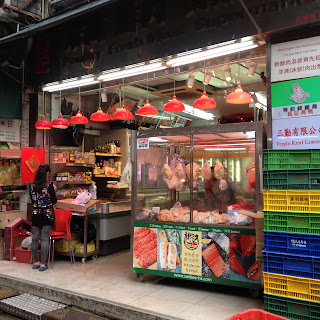Considering I was convinced that Hong Kong was meant to be my first Asian home, I was surprised it took me so long to get there. With the clock rapidly counting down until the end of the school year, I started to see those short flight hop opportunities dwindle. As such, Dawn and I packed our bags to make the three-hour journey to one of China's SARs (not to be confused with the respiratory infection, but rather the Special Economic Region).
Like Taiwan, Hong Kong holds a tricky status on the world's stage. To sum up a rather long period in history in not enough words, Hong Kong became a British colony in 1842, was then occupied by Japan during WWII, and then handed back to the UK in 1945. In 1997, the UK 'gave' Hong Kong back to the People's Republic of China and the Communist government promised to grant it a high degree of autonomy as one of its two SARs (the other is Macau). Hong Kong has its own economic and political system with lots of nods to their once-British landlords.
Of recent however, the PRC is sinking its teeth in by trying to change the electoral system and 'influence' the politicians who get voted into power. The first time my TV was blacked out by media censors in Shanghai was when the BBC broadcast the
Umbrella Movement protests in September 2014. The pro-democracy movement saw thousands of students take to the streets of Hong Kong demanding an unbiased voice. By December, the protest groups had caused considerable annoyance to commuters and the government; protestors' camps were quickly cleared and shut down. As was the argument.
Time will tell on how it will all pan out but Hong Kongers are fiercely proud of their sprawling metropolis. And, really, it's got it all: financial powerhouse of Asia; cosmopolitan China that's nothing like the mainland; beaches to boot; a city teeming with expats, electronics; Michelin starred restaurants standing side-by-side family dim sum diners. All crammed into a series of islands and connected by ferry boat, taxi or very British double decker bus.
The mass of Hong Kong island from our hotel window:
View from The Peak on a brief moment of cloudy sunshine:
Ferry to Kowloon:
Kowloon looms:
Trolleys across the city:
Streetview Hong Kong island:
It's all very civilised, very manageable. A friend who lived there for years called it 'expat lite' and I totally get it. Not that I can say much because Shanghai is very much 'China lite'. But there's lots of little niceties that make Hong Kong completely livable. Take the mid-level escalator, for example. Sounds unimpressive until you note that it's the longest outdoor covered escalator in the world. The World. 800 metres of unadulterated electric stairs that take a person up 135 metres of elevation. And like some kind of Jetson-esque view of the future there's a million pick up and drop off points with shops, restaurants and bars along the way.
And along the escalator you might see food stalls:
Sadly, the city is trying to get rid of them and has found a convenient loophole. The government will not grant new permits to new vendors and won't let families change the name on the permits. As such, they're waiting out old people to die and then getting rid of the street stall:
In other places, wet markets are being edged out by new building projects (note the green awnings). And so it seems that the pace of progress in China extends as far as HK:
The price of progress is not always great. But there's still some time for tradition:
A family run sugar cane juice shop. Not exactly to my taste but it's been going strong for over 100 years:
And progress also means some cool graffiti:
I suppose I'm glad that I didn't end up living here partly because I think it would have been harder to leave. In other ways, mainland China has proven a bigger challenge, possibly a crazier adventure, in no ways undiscovered but still that much edgier. But that shouldn't overshadow Hong Kong's special something, unspoken but definitely not unfelt.











































